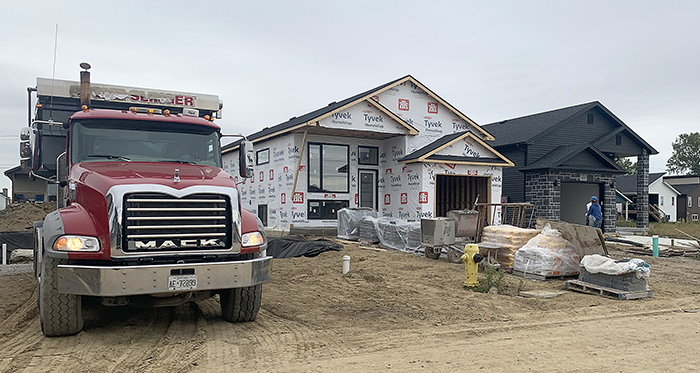
Chatham-Kent home builders didn’t like it a year ago, and they’re still unhappy.
Dan VanMoorsel, executive officer with the Chatham-Kent Home Builders’ Association, said nothing has changed from Aug. 8, 2022 when Chatham-Kent council approved an additional $17,316 development charge on the cost of building homes here.
The added charge came at a time where the local housing market was in sharp decline from where it was in previous years. Interest rates were rising and housing prices were dipping from historic highs.
Fourteen months have passed and VanMoorsel said the builders have still not been able to speak directly to council on the matter.
He stressed the stakeholders should have had the opportunity to speak.
“They (administration) are just making decisions for our industry without involving our industry,” he said. “We were never given a direct voice to council.”
Municipal officials aren’t saying much at this time, as they said the home builders and other developers have started a legal proceeding in regard to the development charges.
VanMoorsel said the home builders have taken the matter to the Ontario Land Tribunal. But he added dialogue can be maintained despite the process.
“We’re not suing them. We’re going to the land tribunal to hopefully have a third party weigh in on how we can come to some kind of agreement,” he said.
Municipal officials said as the population grows, additional pressures are brought to bear on infrastructure.
“The money the municipality collects from development charges pays for part of the capital costs due to more people using the infrastructure,” according to a municipal release.
Such costs include everything from adding capacity on roads due to increased traffic, expanding libraries, increasing park amenities, water and sewer extensions, and more, officials said.
“It is important to understand the impact of development charges on all citizens of Chatham-Kent. Development charges are fees collected by the municipality for new development and redevelopment of land. Collecting development charges is the primary revenue tool that is available through provincial legislation for funding growth-related capital costs,” officials said in the release. “This reduces the overall burden on the taxpayer.”
VanMoorsel said it’s not the concept of increased development charges that the home builders oppose, but rather the lack of communication.
“We’re not against the development charge. We just want something that is fair in the way we (as a municipality) are growing and how we’re growing,” he said.
Robb Nelson, president of MCH Homes, one of the largest locally owned builders in the municipality, agreed.
“We’re trying to solve this situation where a massive tax was just added with no consulting of the actual stakeholders that drive the industry,” he said. “It doesn’t matter the size of the home, it (the charge) is $17,300. You have to pay it if you want a (building) permit.”
Nelson said development charges on a home went from $7,800 to more than $20,000 essentially overnight last year. Plus, other costs related to the charges only add more to the price of a new home in Chatham-Kent as a result.
“We (home builders) have to buy that permit up front before we can put a shovel in the ground. We have to put that money, plus the HST, into the permit. That’s a carrying cost of seven or eight months,” he said of the time from obtaining a permit to completing and hopefully selling the home. “It costs us another 10 or 12 per cent on top of that with borrowing interest. Then you mark it up on the sale of the house.”
He estimates it can add up to an additional $36,000 on the price of an average new home, versus about $10,000 prior to the new charges.
VanMoorsel said Chatham-Kent has a nice cost advantage over most other municipalities in the province – until the new charges were tacked onto every new build, and that has slowed the migration of people coming to C-K from larger, more expensive cities.
“We have land ready, we have good quality builders but when you start adding costs, we’re not attractive anymore because our cost advantage has been taken away,” he said.
Nelson said the new charges are especially hard on the smaller home builders in the municipality.
“We have a whole bunch of amazing small builders in our community. They only have so much capital to outlay,” he said. “They may cut production and that in turn impacts their cost to build. The pricing isn’t as good for supplies and for the trades. It drives up the price of a house even further.”
In recent years, MCH Homes has built an average of nearly 100 homes a year. Nelson said the difference in paying these increased development charges is expensive.
“That’s a lot of cash. That’s on top of buying the land. We have to take a few million out of our cash flow and give it to the municipality,” he said.
He believes municipal officials have missed the reality of the increase in property taxes flowing into municipal coffers as houses are built and sold.
“If you look at 300 new units going in (each year), that’s about $1.5 million in new tax revenue (annually) and that’s perpetual,” Nelson said, basing his comment on new homes averaging about $4,800 in annual property taxes.






